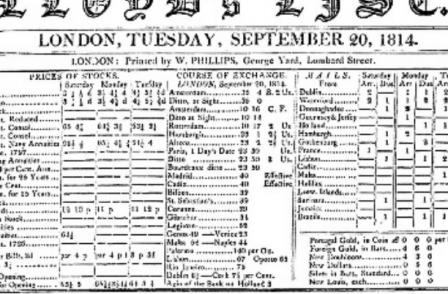
Today Lloyd's List publishes its last print edition after 279 years as a newspaper. No journalists are losing their jobs as a result of the move to digital-only publication. Here editor Richard Meade looks at his title's transition from a being a printed notice on coffee-shop walls to a digital-only publication read on computers and smartphones around the world
Two hundred and seventy nine years is a blink of an eye in shipping.
In important ways, the information needs in shipping have remained the same. You need verified facts to make quick decisions and you need to keep an eye on what everyone else is doing.
But in that timespan — in fact, only in the portion of it comprising the past 25 years — we have seen an extraordinary revolution in communications.
We get instant feeds of ship positions anywhere in the world and mobile phone snapshots of casualties as they happen.
We know when a vessel is evading sanctions; when very large crude carriers are frequenting new corners of the oceans as tonne mile advantage shifts; we see how piracy has altered shipping routes; gain quick knowledge of rates shifts; and gauge how many vessels a port strike has turned away.
We can use all of this to put together the even more valuable long-term picture, interpreting the signals in the information and their bearing on strategy.
Information is power in shipping — it always has been.
Our founder Edward Lloyd recognised that back in the late 17th century, when he first started publishing a weekly newsletter and we believe he would not have thought twice about the decision to introduce Lloyd’s List in an all-digital form.
Indeed, the principles of Lloyd and his famous coffee shop translate into the digital world of today rather nicely. The entrepreneurial Lloyd would perhaps have seen the commercial advantage to shipowners of the internet long before it struck journalists or media companies.
One reason: the web provides a kind of proximity that paper can never manage.
It takes time to get an edition to the printing house and, while those presses groan, new developments emerge that can change the character of the information.
The physical world moves slowly: editions are loaded on trucks, fan out on city streets, head for the airport, bound for all points.
Readers obtain them by delay, influenced by accidents of weather, distance and transportation. This leads to what is known in economic circles as asymmetry of information.
As it happens, the digital world has allowed information users to leapfrog that asymmetry and return to the kind of proximity offered by Lloyd and his coffee shop, where a community of like-minded practitioners clustered
in search of the information that would make — or save — them money.
Shipowners put more at stake, pound for pound, than in most major fields. The structure of the profession ensures the risk is often hugely personal.
The immediacy of the digital world restores some of this Georgian flavour. The coffee shop, with its characteristics of smoke, chatter and Arabica, offered a door to companionship — and opportunity.
Lloyd’s List is merely continuing this tradition, with a digital twist.
What started life as a printed notice pinned to a coffee shop wall in London is now the shipping industry’s most sophisticated online intelligence tool, accessible in any coffee shop — indeed anywhere in the world — 24 hours a day.
This next stage in our evolution at Lloyd’s List will ensure we are able to innovate and expand our digital platforms, offering more in-depth analysis, more powerful online tools and the most accurate and timely intelligence service in the market.
The digital revolution has fundamentally altered the distribution and organisation of content, but Lloyd’s List’s near-300-year-old tradition of authoritative, trusted journalism and analysis performed by industry experts remains unchanged.
Indeed, in the age of the internet, where information is abundant, comment is free but verified facts are few and far between, Lloyd’s List’s authority, accuracy and its editorial independence are more important now than at any point in our history.
The pace of change, both in media and shipping, is necessarily relentless.
As the articles in this final print edition make clear, shipping is a sector that has always evolved to meet that fundamentally unchanging need to move commodities and finished products from where they are to where they are needed.
It is our belief there is at least as much interesting innovation ahead as that which lies behind us.
For shipping, the need for ever greater technical and organisational efficiency will continue to drive innovation at all levels.
Looking ahead for Lloyd’s List, we fully expect the communications revolution to continue.
The recent 300-year sprint from letter, to telegram and Boecode, to mobile networks, email and the web is inevitably just the start. Expect computers in eyeglasses, advances in holography and 3D representation, advances in mapping, neural networks, quantum computing delivering unimaginable speed and computer power…
But check in again in the year 2292: there will still be ships and there will still be Lloyd’s List to analyse the risk and opportunities inherent in their operation.
Email pged@pressgazette.co.uk to point out mistakes, provide story tips or send in a letter for publication on our "Letters Page" blog

